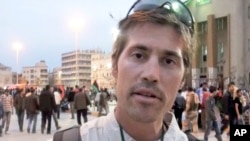The United States acknowledged Wednesday it launched an unsuccessful military rescue operation earlier this year to free American hostages held by Islamic State (IS) militants in Syria. The announcement came the same day President Barack Obama condemned the execution of an American journalist and called for regional action to extract the IS extremist "cancer" before it spreads.
Pentagon spokesman Rear Admiral John Kirby said the United States attempted to rescue a number of American hostages held by “a particular captor network” within IS in Syria. He said the air and ground operation was not successful because the hostages were not present at the targeted location.
Presidential assistant on counterterrorism Lisa Monaco said the operation, which took place earlier this summer, was authorized by Obama because of the assessment that the hostages were in increasing danger with each passing day.
Pentagon acknowledgement
Rick Brennan, senior RAND Corporation political scientist and career U.S. Army officer, said gaining actionable intelligence for such an operation is always a challenge, but he is surprised the Pentagon acknowledged the unsuccessful mission publicly.
"Trying to get current intelligence for this type of operation is extremely difficult. We had so many attempts that were aborted, if you will, with bin Laden. Very rarely do you hear about the Department of Defense discussing these types of capabilities. So, yeah, it is odd that the Pentagon and the White House have come out and acknowledged that we conducted this kind of raid, and that it failed," Brennan said.
The Pentagon and White House statements were issued the same day Obama acknowledged the beheading of American freelance journalist James Foley seen in a gruesome video made public Tuesday. He said the world is appalled by the brutal murder and denounced the group’s acts of murder, abductions, torture, rape and slavery.
"From governments and peoples across the Middle East, there has to be a common effort to extract this cancer, so that it does not spread. There has to be a clear rejection of these kinds of nihilistic ideologies," Obama said.
The president said there is no place for IS militants in the 21st century.
IS threat
U.S. State Department spokeswoman Marie Harf Wednesday said Washington has spoken with a number of regional partners who understand how serious a threat IS poses.
"Countries in the region are very, very concerned about this. We’ve worked with them to cut off financing [of IS], working to cut off the flow of foreign fighters, so we can start to deprive ISIL of the oxygen that it’s had and has really allowed it to flourish," said Harf.
Interpol says the beheading of a U.S. journalist by Islamic State militants shows the need for a coordinated global effort to combat the threat posed by foreign fighters traveling to conflict zones in the Middle East.
The group said Thursday the killing of James Foley has appalled the world and illustrates the "depravity" of the Islamic State fighters operating in Iraq and Syria.
But terrorism expert Greg Barton, who heads the Center for Islam and Modern World at Australia’s Monash University, said the terrorist threat continues to grow in the region and IS continues to add fighters to its ranks.
"We used to think that had maybe 6,000 militants in Iraq and a similar number in Syria. We’re now seeing multiples of that number. We do know that many more foreign fighters have come in over the last few weeks and we know that they’re recruiting locally as well, and it looks as if they have some core strength in the several tens of thousands," said Barton.
Provocation
Barton said the brutal execution of Foley is designed to provoke an angry response from the West, and that may be a way for the Sunni extremist group to tell would-be donors and recruits that the world is at war with Islam. So far, he added, the Western response has been restrained.
Despite militant threats to kill another captive American journalist, Steven Sotloff, over U.S. aerial attacks on IS targets in Iraq, those air strikes continued Wednesday with another 14 in the vicinity of the recently recaptured Mosul Dam. Brennan said the United States has little choice but to continue its aerial campaign in support of Iraqi and Iraqi Kurdish operations against IS.
"If you fail to take action, because of a terrorist threat, then it binds your hands to do the kinds of things that protect U.S. interests. I think that it’s absolutely impossible for the president to try to back down and not do what he thinks is right because of the threat of an American being killed," said Brennan.
Writing Wednesday in Commentary magazine, Council on Foreign Relations national security expert Max Boot said what is needed now is a coherent military strategy to annihilate IS. He said that would include an enhanced air campaign coupled with thousands of U.S. advisors and special operations troops working with moderate forces in Syria and Iraq to root out IS militants from their newly-conquered territory.





